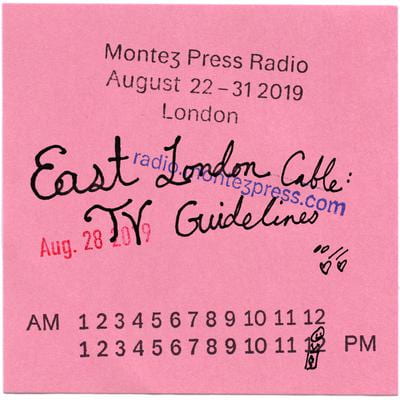East London Cable are making television content for a post-broadcast world. Drawing on grassroots activism and histories of artist-run sites of production, display, discussion and distribution; the collective is proving that an archive of radical material needs its own radical form.
Formed in London in 2018 East London Cable (ELC) are a collective who produce, platform and commission moving image work under the umbrella ‘TV.’ Working from a wide range of sources including 70’s/80’s public access television, which foregrounded local content and issues, ELC considers how live-to-digital and streaming technologies can enrich the contemporary production and consumption of this media. Bringing form and content together ELC combine contemporary social and artistic issues to bear on a recent but almost forgotten utopic function of television, to distribute information equally across a population, making culture accessible and relevant without discrimination or customisation.
Here Louis Brown, Sung Tieu and Jos Bitelli from ELC discuss their work on Montez Press Radio with Amal Khalaf:
ELC also includes: Aoibheann Greenan, Dan Marre, Eve Stainton, Florence Peake and Wojciech Kosma.
The collective’s curatorial outcomes manifest as a televisual series titled ELC TV Dinners. The patchwork event format of ELC TV Dinners emulates the eclecticism of channel-hopping. This style of tv consumption preceded digital streaming and has largely vanished in our current media climate that is dominated by global corporations presenting homogeneity under the guise of choice. For ELC, television is an institution with an abandoned potential. It is only by working through—with and against the form of television—that we the viewers can re-access what was and might have been. Through their production and programming the collective are building an archive and blueprint for an alternative institution.
FRIGHTFUL PARENTS
ELC are exemplary of the practice of institutional critique as combustion engine for artistic production. formed a decade after the onset of austerity politics in Britain: a political imperative which sought to recuperate financial losses sustained in the banking crisis of 2008 through cuts to public spending. The full economic consequences of the Covid-19 pandemic are still yet to be felt, but under the current Conservative government we can be fairly certain that more austerity will be used to cure the ill-effects of the virus suffered by an already malnourished public sphere. The NHS, BBC, education and social welfare are heavily targeted by such policies as are the arts and culture.
Under increased financial stress UK artists and art organisations have explicitly addressed the government’s ambivalence to contemporary culture that does not adhere to the narratives of national heritage or technological and industrial progression. Part of this counter-cultural move has been a specific attention paid to lives and experiences which fall outside of models of productive and idealised citizenry; lives that are migratory, imprisoned, trans, poor, racialised, sick, disabled… Working with artist Rosa-Johan Uddoh, ELC produced ‘Performing Whitness’ a filmed performance which explores the labour of performance by brown-skinned women, commissioned as part of the Nam June Paik exhibition at Tate Modern in 2019. Other projects include a talk show for doctors, healthcare workers and their patients/ clients ‘The Procedure,’ commissioned by Nottingham Contemporary in 2018.
Often focusing on the organisational and bureaucratic challenges brought about by the receding state and folding issues of management and structure into their work, other UK based projects which reflect the urgency of art to examine its own production and distribution models include the London Community Video Archive, Lloyd Corporation and not/nowhere. Not/nowhere have continued and adapted the legacy of the no.w.here film organisation to provide infrastructural support to artists working in film and media, centralising the work of black and POC artists and equipping artists with the means of production for their work. Older and longer-standing examples of artist-run organisations, which can be understood to have organisation as an art practice include the feminist film group Cinenova and stretch back via the legacies of the Women’s Art Library, Half Moon Photography Workshop, London Film Co-Op and Artist Placement Group.
Foundational to collective practices such as ELC is a form of economic pragmatism which reckons with the necessary contradictions and compromises of cultural production. Eschewing the austerity narrative of inherited debt from earlier generations’ experimentations, ELC have embraced histories of radical practices and acknowledged their dependency on mass technology. As David Antin wrote of video art’s relationship to television in 1975 “…it is unwise to despise an enemy, especially a more powerful, older enemy who happens to be your parent.”
Find out more about ELC on their website.
As a grassroots organisation accept donations via PayPal: contact@elc.vision
PDF of David Antin’s 1975 ArtForum article ‘Television: Video’s Frightful Parent’ here.


Published by